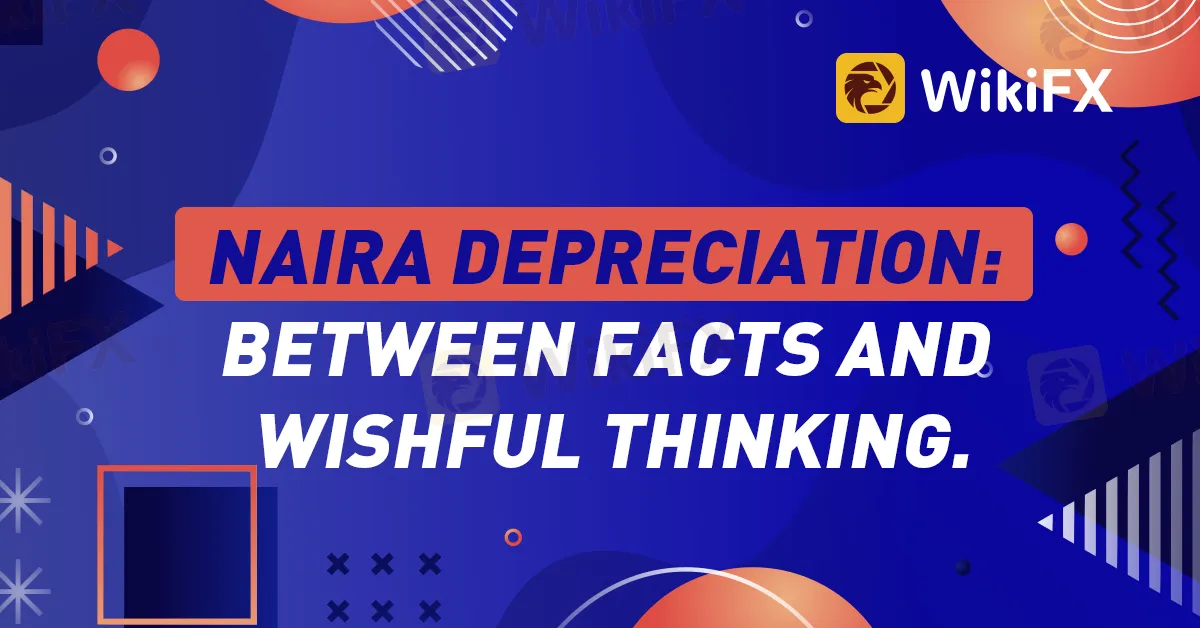简体中文
繁體中文
English
Pусский
日本語
ภาษาไทย
Tiếng Việt
Bahasa Indonesia
Español
हिन्दी
Filippiiniläinen
Français
Deutsch
Português
Türkçe
한국어
العربية
NAIRA DEPRECIATION: BETWEEN FACTS AND WISHFUL THINKING.
Abstract:Nigerians frequently lament the depreciation of the Naira, blaming it on irrational individuals out to harm the economy for their own gain. Because of the actions of rogue rent-seekers, the average Nigerian sees the currency's value diminishing day by day as a means of commerce, a store of value, and a measure of postponed payment.

Nigerians frequently lament the depreciation of the Naira, blaming it on irrational individuals out to harm the economy for their own gain. Because of the actions of rogue rent-seekers, the average Nigerian sees the currency's value diminishing day by day as a means of commerce, a store of value, and a measure of postponed payment.
For failing to “defend” the currency, the leadership of the Central Bank of Nigeria (CBN) is also somewhat to blame. The CBN should muster the strength to refute such critics and figure out practical solutions to strengthen and maintain the naira. However, doing so is akin to searching for a needle in a haystack.
The naira has lost 125.4 percent of its value over the past seven years, falling from an official rate of N197 per US dollar in 2015 to N444 per US dollar in 2022. Similar to the stock market, the parallel market fell 227.7% from N235/US$1 in 2015 to the current N770/US$1 after reaching N950/US$1 a few weeks ago. Nigerians continue to live in a nightmare, which affects every aspect of our daily lives.
There is no need to speculate about what has occurred during the past seven years. It is directly related to the economy's low productivity. The National Bureau of Statistics (NBS) reports that GDP will grow by 2.25 percent in the third quarter of 2022, making it clear that the economy is drastically underperforming. As the official unemployment rate is 33 percent, the Naira's sharp depreciation is reflected in the high inflationary trend, which reached 21.1 percent in October 2022.
The growing Dutch has cast a looming doom on crude oil, which provides for 90% of the country's foreign exchange earnings and 85% of its budget funding, is a more worrisome aspect. The government is embarking on endless borrowing to the tune of N42.84 trillion as of the first half of 2022 because of the widespread oil theft, which has depleted the earnings from that source and exacerbated the nation's economic challenge. Our debt service to revenue is now equal to 100%. The country's refineries have been idle for many years since we import gasoline to suit our domestic needs and spend a lot of money on subsidies.
The CBN invests a lot of money to protect the naira. However, if the economy is not producing and exporting enough to generate enough foreign currency, then the fight to protect the Naira against foreign currencies will be in vain. This is what strengthens the currency and draws in investment.
There have been conversations about increasing our foreign reserves and luring in outside capital. It is still necessary to create an atmosphere that encourages both local and foreign investment in the economy. This is essential because, in the absence of local investment, the ordinary international investor is unlikely to choose the local market. This newspaper urges the quick implementation of current domestic productivity-boosting programs.
Nigeria has launched several export promotions campaigns, which have the added benefit of creating jobs and increasing income. The CBN RT200 FX scheme is one of these measures, to help output in order to increase non-oil currency profits. Along with the PAVE (produce, add value, and export) policy of the central bank, this should be aggressively pushed.

Disclaimer:
The views in this article only represent the author's personal views, and do not constitute investment advice on this platform. This platform does not guarantee the accuracy, completeness and timeliness of the information in the article, and will not be liable for any loss caused by the use of or reliance on the information in the article.
Read more

March Oil Production Declines: How Is the Market Reacting?
Oil production cuts in March are reshaping the market. Traders are closely watching OPEC+ decisions and supply disruptions, which could impact prices and future production strategies.

How to Calculate Leverage and Margin in the Forex Market
Leverage amplifies both potential profits and risks. Understanding how to calculate leverage and margin helps traders manage risks and avoid forced liquidation.

RM1.29 Million Lost in ‘C Baird VIP’ WhatsApp Scam
A 43-year-old company auditor and subcontractor in Malaysia became the latest victim of an elaborate investment scam after losing RM1.29 million to a fraudulent scheme promoted via WhatsApp.

U.S. March ISM Manufacturing PMI Released
The U.S. March ISM Manufacturing PMI data shows that manufacturing has contracted for the first time, and investors should pay attention to future changes and impacts on the sector.
WikiFX Broker
Latest News
Exposing the Top 5 Scam Brokers of March 2025: A Closer Look by WikiFX
Gold Prices Climb Again – Have Investors Seized the Opportunity?
Webull Launches SMSF Investment Platform with Zero Fees
Australian Regulator Warns of Money Laundering and Fraud Risks in Crypto ATMs
The Withdrawal Trap: How Scam Brokers Lure Victims into Paying More
FCA to Investors: Think Twice Before Trusting These Brokers
Trump\s tariffs: How could they affect the UK and your money
Trump gambles it all on global tariffs he\s wanted for decades
TradingView Brings Live Market Charts to Telegram Users with New Mini App
HTFX Spreads Joy During Eid Charity Event in Jakarta
Currency Calculator







